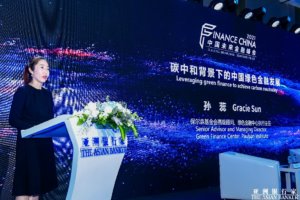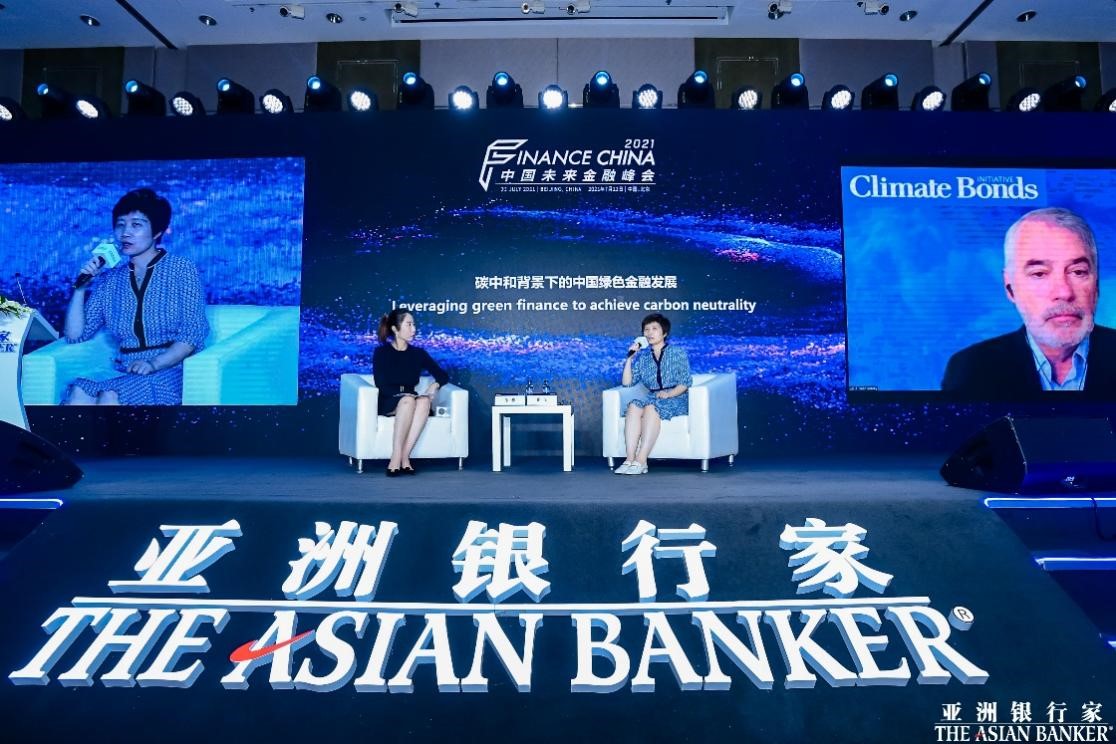On July 22, The Asian Banker hosted the Finance China 2021 summit in Beijing and virtually. Representatives from international organizations, domestic think tanks, and financial institutions discussed the theme of “New Era, New Finance, New Integration” focusing on carbon neutrality, green finance, and fintech.
Gracie Sun, Senior Advisor of the Paulson Institute and Managing Director of the Green Finance Center, moderated a discussion on China’s green finance development and carbon neutrality with Sean Kidney, Co-Founder and CEO of the Climate Bonds Initiative, and Cui Ying, Director of Climate Finance Research, at the International Institute of Green Finance, Central University of Finance and Economics.
 To open the session, Sun noted that “since the inaugural year of China’s green finance in 2016, great achievements have been made including the development of green standards, the establishment of green finance product systems, local green finance innovation, and international cooperation. China’s green finance has maintained a high growth rate. With the goal of carbon peaking and carbon neutrality, China’s green development enters a new stage. Experts expect that the green and low-carbon investment required for China to achieve carbon neutrality in the next 30 years will be trillions of yuan, so it is crucial to promote the development of green finance.”
To open the session, Sun noted that “since the inaugural year of China’s green finance in 2016, great achievements have been made including the development of green standards, the establishment of green finance product systems, local green finance innovation, and international cooperation. China’s green finance has maintained a high growth rate. With the goal of carbon peaking and carbon neutrality, China’s green development enters a new stage. Experts expect that the green and low-carbon investment required for China to achieve carbon neutrality in the next 30 years will be trillions of yuan, so it is crucial to promote the development of green finance.”
As part of the dialogue, Kidney spoke about the definition and taxonomy of green bonds and other instruments in China, EU, and other countries and regions. He argued that a uniform definition of green financial instruments across countries can facilitate greater cross-border flow of green financing and accelerate the green transition of society and the economy like in the case of traditional industries from steel to aviation that contribute to 70 percent of global greenhouse gas emissions. He also stressed the need for green finance standards to be aligned with Paris Agreement goals.
Additionally, the panel discussed green finance internationally, how carbon markets can support carbon neutrality, and the fintech related challenges in promoting green finance and sustainable development. Cui Ying laid out the differences between a carbon tax and a carbon market as policy tools where the latter is suitable for industries with more concentrated emissions such as power and industry, while the former can be used as a supplement to restrain industries with less concentrated emissions. He suggested the process of building carbon markets should be managed through digitalization to increase transparency but also identified the need to refine and unify green standards as a key challenge for this to happen and generally in applying fintech to green finance.
In closing the session, Sun remarked that “financial support for carbon peaking and carbon neutrality boils down to formulating sound policies and building a good incentive and regulatory system which guides funds to flow to green and low-carbon industries. These areas still have great opportunities for development and improvement in the future.”





